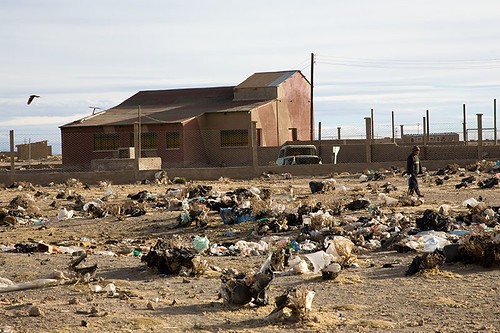美洲開發銀行宣布,將提供波利維亞2000萬美元貸款以改善該國的都市固體廢棄物管理,包括蒐集、運輸及處置都市固體廢棄物等業務。
環境與水資源部將負責新計畫執行,預計全國垃圾處理率將由37%提升至51%。這將有助於波利維亞的里韋拉爾塔(Riberalta)及波托西(Potosi)等城市改善市容;波托西為全世界最高的城市,一度盛產銀礦。
這項計畫比照波利維亞首都拉巴斯等城市的成功案例,美洲開發銀行估計,將有百萬人受惠。
藉由贊助市政服務如街道清掃、蒐集、清運、回收集處理固體廢棄物,可以讓更多的垃圾進入掩埋場(而不是街道上)並增進經營效率。
這項計畫也希望改善在掩埋場從事回收工作者的生活品質,在正規勞動計畫結構下提供培訓課程。
波利維亞全國共有4.6%的都市固體廢棄物由拾荒者自住家、街道或自垃圾場回收。環境與水資源部在其貸款文件中表示,拾荒者多為移民、失業者、寡婦、殘疾者、老人或孩童等弱勢族群,這些在街上或是垃圾場工作的人通常沒有特殊技能並缺乏教育。
約有一萬波利維亞人從事長期拾荒工作、另有10160人是暫時性的拾荒者。這些人中約有80~85%為女性並集中在拉巴斯、聖克魯斯、科恰班巴及埃爾阿爾托等城。
2012年10月,波利維亞國會批准回收法,這是該國第一個確認拾荒者的權益及他們的工會的法律。法律保障無論是街頭或是在垃圾場工作的拾荒者,透過特定機構的認證都可以成為法定勞工。法律規定市政府應支持他們籌組工會或投資拾荒者為服務供應商工作。
美洲開發銀行在其批准貸款聲明中表示:「就市政服務而言,都市固體廢棄物經營過程的各層級利益相關者,他們的參與和訓練,無論對財政或制度面的永續,都是重要的。」
在加入環境與水資源部的計畫前,各市政府必須簽署它們如何維護及營運垃圾場的協議。市政府必須擁有或取得垃圾場土地的使用權,且這些位址必須有適合清運垃圾的道路。
 在每個垃圾掩埋場開始作業前,環境與水資源部將依波利維亞國家標準準備環境影響評估書及環境與社會經營計畫給美洲開發銀行。
在每個垃圾掩埋場開始作業前,環境與水資源部將依波利維亞國家標準準備環境影響評估書及環境與社會經營計畫給美洲開發銀行。
環境與水資源部表示,全國的都市固體廢棄物總量為1.74噸。約有87%來自都市,13%來自鄉村。大都會每人每日平均產生0.53公斤的垃圾、鄉村社區每日平均產生0.2公斤。
雖然在波利維亞都會區有86%垃圾清運服務,但全國平均只有34%的地區有。
波利維亞只有45%的垃圾進入垃圾掩埋場(自治市為3.1%),18%進入投棄型掩埋場(controlled dumps)(自治市為6.1%),37%進入露天垃圾場(自治市為90.8%);這些垃圾場中有30%鄰近水源,而這些水資源用於日常生活及灌溉。
玻利維亞政府在其貸款申請文件中表示,廢物管理服務的需求已經超出國家的技術和財政能力,經常性的短缺有時會導致環境崩潰,尤其在大城市地區。
以財政來說,全國327個自治市只有54個(17%)收取垃圾清運費用,這只夠負擔40%及60%的清運成本。不足的部分通常由市級預算補貼。
在多數的案例中,垃圾清運服務問題會伴隨貧乏的服務及缺乏有品質的載體等問題。
像是埃爾阿爾托和科恰班巴這樣的城市,垃圾場多已超過了使用年限或再1-3年就會超過使用年限。
這筆貸款在美洲開發銀行內有兩個來源:1600萬美元來自普通股資本,將有30年的償還期、6年的寬限期,利率為浮動利率;400萬美元來自特別行動基金,提供40年的償還期與寬限期,每年利率為0.25%。
Bolivia will improve municipal solid waste management services such as collection, transportation, and disposal, with a $20 million loan from the Inter-American Development Bank, the bank announced today.
The Ministry of Environment and Water will run the new program, which is expected to increase the final disposal of trash in landfills from 37 percent to 51 percent nationwide. It will contribute to environmental improvements in Bolivian cities such as Riberalta and Potosi, the highest city in the world once flush with silver from the mines of Cerro Rico.
The program was designed around lessons learned through successful experiences in other cities, including Bolivia’s capital, La Paz. The bank calculates it will benefit approximately one million people.
Municipal services such as street sweeping, collection, transportation, recycling and disposal of solid waste will be funded to increase the disposal of trash in landfills and improve the operating efficiency of service providers.
The program also aims to improve the quality of life for recyclers currently working in landfills, offering them training under the framework of a labor inclusion and formalization plan.
Nationwide, 4.6 percent of municipal solid waste is recovered by waste pickers who either collect trash door-to-door or work at trash holding facilities.
Waste pickers are vulnerable individuals – migrants, the unemployed, widows, people with disabilities, the elderly, children, all of whom are unskilled and have little education – who work in the streets and at final disposal sites, the Ministry of Environment and Water said in its loan proposal document.
About 10,000 Bolivians work permanently as waste pickers as well as 10,160 occasional pickers. About 80 percent to 85 percent of them are women concentrated in La Paz, Santa Cruz, Cochabamba, and El Alto.
In October, the Bolivian Congress approved recycling legislation that recognized the rights of the waste pickers and their associations for the first time. The legislative proposal establishes that the state, through particular departments, recognize and formally certify waste pickers as competent workers, regardless of the manner in which they acquired their skills. The legislation states that municipal governments should support the formation of associations or ventures for waste pickers to work as service providers.
“Participation and training of all stakeholders at all levels of the solid waste management process is crucial to the financial and institutional sustainability of these municipal services,” the bank said in a statement today announcing the loan.
Before awarding contracts for works financed by the program the ministry and each municipal government will sign an agreement specifying how the municipal government will maintain and operate its sanitary landfill. The municipal government must own or be entitled to use the land where the landfill will be located and the sites must have roads suitable for the transport of municipal solid waste.
Before the start of the works for each sanitary landfill, the ministry will prepare an environmental impact assessment and an environmental and social management plan in accordance with Bolivia’s national standards and present them to the bank.
According to the ministry, total municipal solid waste generated in the country is 1.74 tons. Of that, 87 percent is generated in urban areas and 13 percent in rural areas. Each household generates between 0.53 kg/person/day in the metropolitan capitals and 0.2 kg/person/day in the rural communities.
Only 34 percent of Bolivians have trash collection services, although the average coverage in capital cities is 86 percent.
Forty-five percent of Bolivian trash is disposed of in sanitary landfills (3.1 percent of municipalities), 18 percent in controlled dumps (6.1 percent of municipalities), and 37 percent in open-air dumps (90.8 percent of municipalities) with 30 percent of those dumps close to bodies of water used for human consumption and irrigation.
The demand for waste management services has outstripped the country’s technical and financial capacity, leading to recurring shortfalls that sometimes give rise to environmental collapses, particularly in the capital cities, the government of Bolivia said in its loan proposal documents.
In terms of financial sustainability, just 54 (17 percent) of the country’s 327 municipalities charge for the service through trash collection fees, which cover only 40 percent and 60 percent of operating costs. The shortfall is generally subsidized through municipal budgets.
In most cases, there are problems associated with trash collection and transport service, including poor service and a lack of sufficient quality containers.
As for final disposal, in cities such as El Alto and Cochabamba, disposal sites have exceeded their useful life or are approaching it with only one to three years of useful life remaining.
The resources for the loan come from two sources within the Inter-American Development Bank – $16 million will be drawn from the IDB’s Ordinary Capital and will have a 30-year repayment term, a 6-year grace period and a variable interest rate. The remaining $4 million, financed by the Fund for Special Operations, will have a 40-year repayment term and grace period, with an annual interest rate of 0.25 percent.
※ 全文及圖片詳見:ENS






